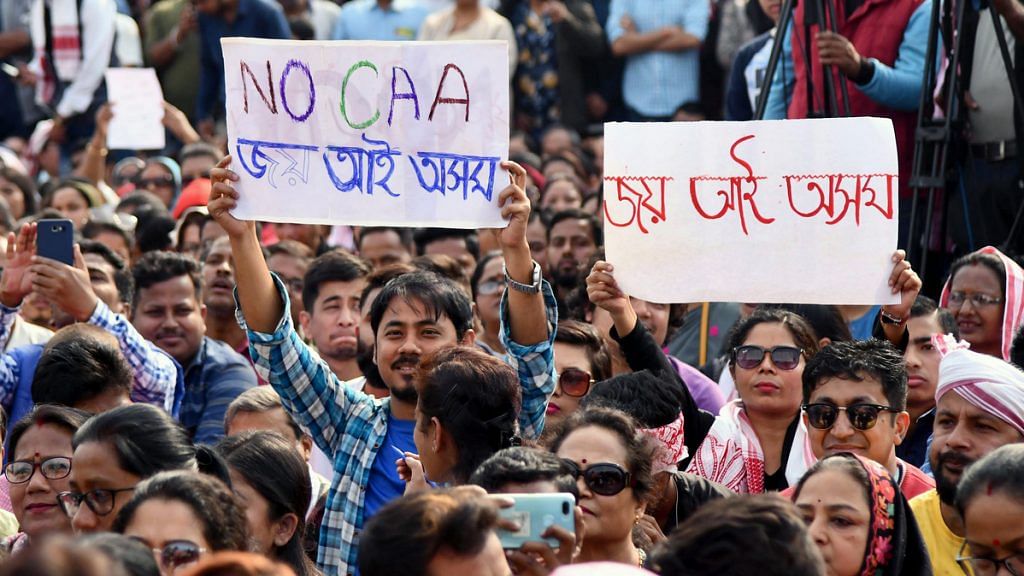As India witnesses massive protests against the amended Citizenship Act, the focus has again shifted from Assam and the northeast to the posh lanes of Delhi and the Jamia Millia Islamia students.
However, with this shift, the Assamese Muslim voice has been drowned even before it could be heard.
Perhaps, there was no need of a distinct Assamese Muslim voice before this – Assam was speaking as one to India and those who sit in the power corridors of Delhi. We have always protested against the Citizenship (Amendment) Bill, now Act, as a state.
But now, I fear my Assamese-Muslim identity is being usurped by the pan India-Muslim voice. So, it has become imperative to tell our story.
Also read: With Jamia, AMU protests, Modi-Shah’s BJP got what it wanted from Citizenship Act
Stolen spotlight
The Assam protests against the Citizenship Amendment Act is not just about protecting the state’s ethnic identity. The binary is not Hindu-Muslim, it is the Assamese and the outsiders. A difference most in India do not understand.
Apart from the new law, Assam is also battling the mainland’s rabid lack of compassion and misconceptions about why we are protesting.
As Assam tries to explain, the national cameras are already moving away to the students’ protests elsewhere. It’s nothing new for us – being an afterthought for the government and the media.
The Assamese Muslim voice is being de-contextualised and shoved under the umbrella of a pan-India Muslim narrative. Many find it easier to categorise us like that. Most national media houses haven’t even made the effort to go beyond Guwahati to listen to the people of Assam.
Assam’s Muslim are not alone because Assam’s Hindus, Sikhs, Christians are all fighting the same battle – to protect the Assamese identity.
But countrymen are not lending Assam their eyes and ears. And the shutdowns don’t help either.
Also read: Pushed to the edge, young Indian Muslims are asked to not react
Not illiberal
The Assamese people are dealing with twin demons – the Citizenship Act as well as the communal politics of the BJP and the RSS, which is a direct attack on the ethnic demography of Assam.
Those who think that Assam is making a big deal out of the Citizenship Act and just want to throw out the ‘foreigner’, do not understand that Assam has bled for six years to update the National Register of Citizens. The Assam Accord has been shred to pieces with this Act. Assam has shown compassion to refugees for decades, but now as it raises its voice against injustice and lurking fear that the Assamese identity will be lost, mainstream media and scholars say Assam is repelling an integrated nation.
Assam has seen a series of tragedies and has stood undivided. But now they call us ‘not liberal’ and ‘xenophobic’. They feed Assam-phobia to the rest of the country, adding communal colour to the protests. Some have even said that Assam protests prove Indian Muslims are now alone in the fight against the citizenship law. That is not only disheartening but also enraging.
The Assamese people have taken bullets in the fight against the Citizenship (Amendment) Act, some have died, and yet they continue to stand in the frontline by the hundreds. They fight for all, including Assamese Muslims. What part of it is illiberal?
Also read: ‘Face of Assam protest’ Zubeen Garg has message for Modi, Shah — don’t treat us like dustbins
My home, always
We don’t need to prove our patriotism. Assamese Muslims have lived in the region for centuries. Ahom army’s navy general Bagh Hazarika (Ismail Siddique) fought alongside Lachit Borphukan in the historic Saraighat Battle on the banks of Brahmaputra in 1671 and put an end to the Mughal ambitions of conquering the northeast. Bahadur Gaonburah, a Muslim artisan, was part of India’s first war of independence in 1857.
Assam has been our home, always.
I am an Assamese Muslim, born in the lush green plains of North Lakhimpur, where the mighty Brahmaputra floods each year and nourishes our land. I grew up in Jorhat, the planned capital of Assam. Never in my 24 years of life have I been put in a situation where I needed to reveal my religious identity, nor was I ever discriminated against for being a minority.
For us, Assam is an identity and religion is a personal belief.
As a child, I remember the men and women in my town coming together to prepare ‘pitha’, ‘pulao’ and ‘duck curry’ during Bihu, without anyone ever bringing up the Hindu-Muslim divide. Our rituals are cultural, not ‘tribal or ‘communal’ – they are for all Assamese people.
I also remember gorging on the ‘proxad’ (prasad), made of sugarcane, chickpeas, seasonal fruits and served in banana leaves, offered at Namgarh, a traditional Vaishnavite Assamese prayer house. At dusk, when the Namgharia (the man who presides over the daily rituals) played the doba, we would light our incense sticks, pray to our respective gods and say ‘nomu nomu’.
No state is perfect, no country is perfect. Assam is no exception. But the Assamese society never alienated the Assamese Muslim, and no one gets to rewrite that history.
